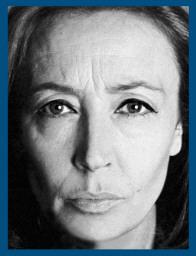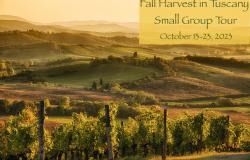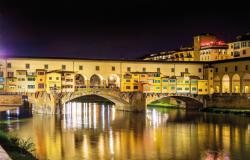A new multi-centre exhibition dedicated to controversial crusading journalist Oriana Fallaci opens in her home town of Florence on Friday.
Known for her abrasive interviewing style, chain-smoking Fallaci (1929-2006) was one of the first female war correspondents and shot to fame in the years before her death with scathing attacks on Islam for which she was accused of inciting hatred against Muslims.
At the show's inauguration on Thursday, Tuscan regional president Riccardo Nencini described Fallaci as ''an absolutely atypical and cantankerous but beautiful person''.
On display are many of Fallaci's personal belongings, including coquettish little hats, glasses, typewriters, scraps of paper covered in notes, books published in various languages, paintings of the white roads and hills of Tuscany, and a large number of photographs.
''Oriana was a very shy person, but she loved being photographed,'' said Fallaci's nephew and curator of the show Edoardo Perazzi.
The show is split over two locations in the city, with a section at Palazzo Medici Riccardi tracing Fallaci's Florentine beginnings, her family and personal history, her anti-Fascist youth and her first steps in journalism.
The second section at Palazzo Panciatichi concentrates on Fallaci's later life as a war correspondent and writer, with objects on show including her clunky tape recorder, the audio tape of a hallmark interview with US Secretary of State Henry Kissinger and the camouflaged rucksack she took with her to Vietnam with instructions for the recovery of her body.
Also on show are some of the articles she wrote for Italian daily Corriere della Sera in the last years of her life.
''We wanted to concentrate more on Oriana's love for Florence rather than the polemics of recent years,'' Perazzi said.
Fallaci sparked a storm with two anti-Islam books after the September 11, 2001 attacks on America - The Rage and The Pride (2002) and The Force of Reason (2004), in which she slammed Islam as ''oppressive'' and Arab immigrants in Europe as ''bigoted''.
Defying political correctness, she wrote that Europe risked becoming 'Eurabia' and had ''sold itself like a whore to sultans''.
Fallaci first showed her combative spirit in joining the Italian Resistance as a teenager.
She was later a war correspondent, covering the Vietnam war, the Indo-Pakistani and Middle East conflicts, and South American uprisings.
She was wounded in 1968 at a protest against the Olympic Games in Mexico City.
Working for Italy's leading newspaper Corriere della Sera and the newsweekly L'Europeo, Fallaci won renown with a series of prickly interviews with some of the world's most powerful figures including Kissinger, Golda Meir, Yasser Arafat, General Giap, Colonel Gheddafi, Indira Ghandi, Deng Xiaoping and Ayatollah Khomeini - defiantly whipping off the headscarf the Iranians forced her to wear.
She harangued Kissinger into calling the Vietnam War ''useless'' - an admission that later prompted him to call the interview ''the single most disastrous conversation I ever had with a member of the press''.
She also worked for leading publications across Europe and the United States including the The Washington Post, the New York Times, Life, the New Republic, Le Nouvelle Observateur and Stern.
Fallaci wrote best-selling works of fiction and semi-fiction including Letter To An Unborn Child (1975), which topped the charts in Italy for years, A Man (1979), the story of the love of her life, tragic Greek leftist Alekos Panagulis, and Inshallah (1990) - her last publication before her anti-Islam tirade 12 years later.
Her works sold millions of copies in some 30 countries including China, Japan, Thailand and across the Arab world, but she always felt an outsider in Italian literary circles.
Spurning the Italian intellectual elite, Fallaci lived most of her later years on the Upper East Side of Manhattan.
She returned to Florence in 2006 a few weeks before her death from cancer aged 77.
Oriana Fallaci - A Florentine by Race runs at Palazzo Medici Riccardi and Palazo Panciatichi in Florence until May 11.





